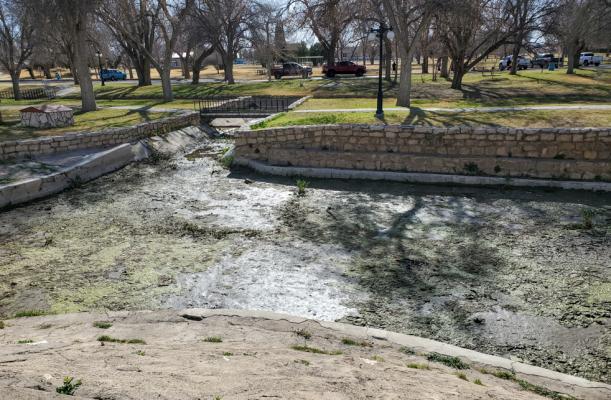Canary in the Coal Mine
Comanche Springs is the canary in the coal mine for our community.
Just as canaries in coal mines warned of threats to human health, the springs warn us of threats to environmental health. In fact, springs are one of the best gauges of the health of most major aquifers in Texas.
If Comanche Springs is flowing, we are not mining the aquifer at that moment – taking more water out than nature puts back in. If the springs aren’t flowing, we’re mining it at that instant.
The desire of the Cockrell Family and Belding Farms is to avoid permanently mining the Edwards-Trinity Aquifer in the future by taking action now. As a family-owned farm that has operated near Fort Stockton for 55 years, we are committed to protecting the long-term reliability of local aquifers and our way of life.
The path to better protection is through more careful planning and more accurate water data.
The Texas Water Development Board agrees with us. It currently is updating its computer groundwater model for estimating the amount of water available in our local aquifers due to concerns over increasing demands and uncertainty about rainfall. The updated model is expected to be ready by next year.
In addition, the Southwest Research Institute is currently studying groundwater recharge and potential changes in Comanche Springs and San Solomon Springs in Balmorhea resulting from land use developments and rainfall trends. Their study is to be concluded next year.
These concerns are justified. Comanche Springs didn’t even flow for a full six weeks this year, the shortest span in at least three years. The brief flow signals stress on the Edwards-Trinity Aquifer.
As a third-generation family business, Belding Farms is worried about whether the aquifers in the Fort Stockton area can be sustained well into the future. The Edwards-Trinity Aquifer is the lifeblood of our community - for residents, businesses, industry, agriculture, and the environment. It is an oasis in our arid climate.
Sustainability is at risk from flawed data because planners are using historical information that is inexact – such as water levels in ditches - to forecast the future. Forecasting out 50 years can amplify even small errors and more precise tools are readily available.
Here are critical areas where water data need to be improved.
Antiquated data-collection methods - Groundwater pumping should be measured by flow meters, rather than ditches and gas bills. Flow meters measure the amount of water actually pumped while gas bills show only the amount of power used to pump the well, requiring extrapolation. Irrigation pumping is a key factor in spring flow, thus accuracy is paramount.
Groundwater and surface water regulated separately – The separate regulatory frameworks for groundwater and surface water leave risky data gaps and create uncertainty because surface water and ground water are interconnected
The Texas Water Code recommends that groundwater districts consider springs and streams in their regulations. The Middle Pecos Groundwater Conservation District should do that more intentionally, and we are encouraged by its participation in the Southwest Research Institute study.
We believe several steps should be taken to ensure sustainability of local aquifers and to restore Comanche Springs to a flow that lasts more than a few weeks a year.
Groundwater Regulation – We support the legislative charges issued to House lawmakers on March 10 to examine the state’s groundwater management policy and regulatory framework. The interim charges issued by the House Speaker also include one that requires a review of large-scale water transfers and their impact on groundwater resources.
We believe that data for groundwater regulation should be improved by using more modern collection techniques, such as requiring flow meters on wells. Our groundwater conservation district also should consider revising pumping regulations to reflect conditions in our area today rather than historical conditions based on questionable data from the past.
The district also should modify its criteria of aquifer sustainability to include spring flow and the possibility of a drought worse than the 1950s “drought of record.” Such events have occurred, according to tree ring data in Texas.
State Water Planning – Proposed water projects that are included in the Texas State Water Plan, which looks out over the next 50 years, must not create new demands that can’t be met for existing or future users.
Texas Water Trade – Our community should support this effort to build a marketplace of voluntary water transactions that can increase supply reliability for people, businesses, and the environment. Through the marketplace, water rights holders can sell or reallocate their rights to meet changing needs - such as the increasingly urgent ones of protecting our aquifers and restoring Comanche Springs.
The gradual restoration of Comanche Springs could provide an economic boost to Fort Stockton and surrounding areas. We firmly believe that protection of our water resources can be balanced with protection of landowner rights if all parties join the effort for sustainability.
Ernie Cockrell and his family own Belding Farms, a pecan business that has operated in Pecos County since 1965. Belding Farms invests $2 million annually in Pecos County through our employee payroll and processing plant and has spent nearly $56 million in operating and capital expenses over the last 10 years. In addition, the farm has invested many millions of dollars in irrigation efficiency over the years.



